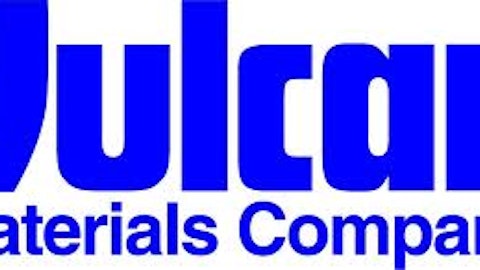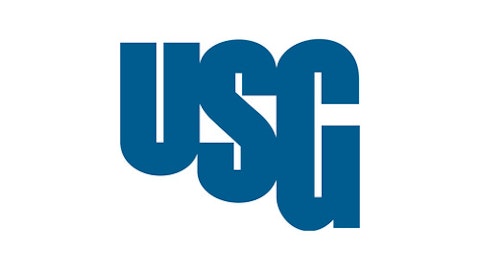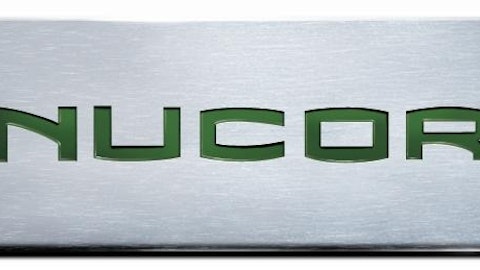Companies can hold onto, or grow, market share in their main segments in a number of ways, and help increase share prices in the process. Let’s see whether the following construction companies can grow by boosting their efficiency, accumulating enough cash and equivalents for buyouts, or creating a wide economic moat through strong relationships.
Masco’s efficiency efforts will begin to pay off
Masco Corporation (NYSE:MAS)‘s main focus is on cabinets and related products, which account for 40% of the firm’s sales. However, the segment is only operating at half of the peak levels it reached before the recession, and its shares similarly trade around half of its all-time high, at $19 per share. Using this as a benchmark, it appears shareholders have the stock priced at about right.
However, it looks like investors have also considered the roughly $180 million the company has spent to increase efficiency — “rationalization costs,” in business-speak — in its cabinet business , which will potentially increase its profit margins.
In fact, Masco Corporation (NYSE:MAS) has spent about $240 million on rationalization costs in its overall business, with the cabinets segment accounting for 75% of those expenses. Like many proactive companies during the recession, Masco was able to dedicate its resources to optimizing its operations. Now that we are exiting the recession, investors will be able to see whether that initiative has paid off.
In the chart below, we can see where the company made considerable investments into improving its operations, causing spurts of losses. But the firm is back in the black, and its rationalization expenses are finished for the time being. If that money was spent wisely, profit margins should continue increasing.
MAS Profit Margin Quarterly data by YCharts
Owens doesn’t have enough cash
Owens Corning (NYSE:OC) is the maker of the Pink Panther insulation that is sold at Home Depot. Along with asphalt shingles, the insulation operation makes up the lion’s share of Owens’ total sales. In fact, Owens controls about 40% of the insulation market segment in the U.S. If Home Depot’s popularity keeps increasing, so could that market share.
But the company can’t rely on the success of one of its dealers. That’s why Owens Corning (NYSE:OC) needs to have a buyout capacity that will preserve and grow its market share. In a $2-billion-a-year industry, being able to buy other firms is almost always necessary. However, this company is nowhere near ready to preserve its market share (see chart below), and growth could be a long way off.
OC Cash and Equivalents data by YCharts
While cash and equivalents isn’t the only component that indicates whether a company is positioned to grow, it does give investors a good idea of what the firm is capable of. Owens Corning (NYSE:OC)’s free cash flow of $330 million last year makes me a bit more comfortable, but it likely needs that money to pay for a large annual chunks of its debt of $2.085 billion, as of last year. That large debt also tells me the company won’t likely be eager to expand by accumulating more debt.
Additionally, the above chart makes me uneasy, as it shows the company is like an all-star quarterback who has a broken arm and won’t be able to execute on the big play.
Furthermore, the firm’s price-to-book ratio is about on par with the industry average, and I agree with shareholders’ evaluation. While the company may seem powerful with its more than $5 billion in annual sales, its expenses are too high (including annual debt payments), causing this firm to keep very little of what it earns.
Tenaris has buddied up with the right people
When we think of construction, we often picture commercial and residential buildings. However, Tenaris S.A. (ADR) (NYSE:TS) has a lock on pipeline development in the oil and gas industry. This company represents the type of firm that doesn’t need to battle as hard as Masco Corporation (NYSE:MAS) and Owens Corning (NYSE:OC), because it has developed close relationships with its clients. Tenaris has also exploited a market niche that is tough for competition to break into. It is an example of what the other two firms should strive for.
But the company still needs to ensure that it has enough cash ready to handle major projects when called upon. Without liquidity and inventory, the firm could miss opportunities for business. But the chart below shows investors have nothing to worry about.
TS Cash and Equivalents data by YCharts
With a combined $3.3 billion of inventory, and cash and equivalents, the firm is poised to maintain its market dominance in its industry. That will allow it to capitalize on an influx in oil projects that are spurred on by the current high fuel price. The company is likely fully valued, with a P/B ratio above the industry average. It deserves that higher valuation because of its wide economic moat.
Final thoughts
Masco Corporation (NYSE:MAS) is the only company of these three that I think is underpriced. Its rationalization expenses, largely in the cabinet sector, improves its competitive advantage in that niche. That will allow it to build cash flow with which to continue its market dominance.
However, Owens Corning (NYSE:OC) lacks the liquid capital resources with which to grow or even maintain its market share in the insulation business.
Tenaris S.A. (ADR) (NYSE:TS) is best friends with many oil giants, likely because it has the inventories and cash ready to pursue any project that comes its way. But that doesn’t mean you should buy the stock. Its shareholders already know what it is capable of, and this has priced the stock to a point where it is already fully valued.
The article Which of These Firms Can Grow Its Market Share? originally appeared on Fool.com and is written by Phillip Woolgar.
Phillip Woolgar has no position in any stocks mentioned. The Motley Fool has no position in any of the stocks mentioned.
Copyright © 1995 – 2013 The Motley Fool, LLC. All rights reserved. The Motley Fool has a disclosure policy.








